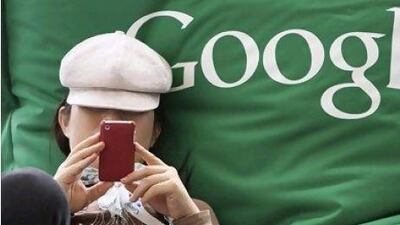The late Apple co-founder Steve Jobs vowed that he would destroy the rival company Google's mobile phone software, Android.
Tomorrow's exclusives tonight:
Industry Insights e-newsletter Stay ahead of the pack and get the pick of the premium Business content straight to your inbox. Sign up
"I will spend my last dying breath if I need to, and I will spend every penny of Apple's $40 billion (Dh146.9bn) in the bank, to right this wrong. I'm going to destroy Android, because it's a stolen product. I'm going to go thermonuclear war on this," said Jobs, according to a new authorised biography by Walter Isaacson,a former managing editor of Time magazine.
Mr Isaacson also claims that Steve Jobs, who died this month, revealed to him that Apple was working on a number of revolutionary new products, including a television set for the 21st century.
But it seems to have been growing competition from Google in the smartphone space that really roused Jobs's passions during his last days as chief executive of the company he had built from a garage start-up into a global electronics giant.
Apple has every reason to be concerned about the growing success of Google's smartphone software.
According to the market research company In-Stat, there will be as many as 339 million budget smartphones powered by Google's Android software by 2015.
Unlike Apple's iPhone software, Android is designed to run on a wide range of smartphones made by competing electronics companies. Google's open-source business model is similar to the one that once enabled Microsoft to dominate the PC market.
What enraged Jobs was that the Android operating system was developed by Google when former Apple board member Eric Schmidt was its chief executive.
Jobs believed that the Android operating system was reliant on many of the features originally developed exclusively for Apple's iPhone. These include features such as multi-touch, swiping and a group of icons representing different applications for the device. It was these features that made the iPhone the world's most sought-after mobile phone.
But, according to the new biography, Steve Jobs, the Apple empire itself was founded on the kind of plagiarism that Jobs was to accuse Google of 30 years later.
The biography reports that Jobs openly admitted to having based Apple's easy-to-use operating system on a graphical interface designed at Xerox's Palo Alto Research Centre in California.
Referring to accusations at the time that Apple had copied the Xerox user interface, Jobs is reported to have said: "Picasso had a saying - 'good artists copy, great artists steal' - and we have always been shameless about stealing great ideas."
Google's chief legal officer, David Drummond, this summer accused Apple of attempting to stifle innovation by using "bogus patents" to target Google's Android partners, including Samsung.
Nevertheless, the battle goes beyond two rival smartphone operating systems.
Despite the anti-establishment period Jobs went through prior to becoming one of the world's top corporate executives, his true legacy may end up being a bridling of the internet that is a far cry from the freedom-worshipping ideals of his hippie youth.
By imposing his perfectionist personality on Apple's products, Jobs insisted that, unlike other manufacturers, Apple make not only physical electronics products, the hardware, but also develop the software needed to run them.
This enabled Apple to offer consumers a seamless experience with products such as the iPod, the first popular digital music player. It was not until the introduction of the iPhone that Jobs began to soften his stance on allowing third-party software developers to write software enabling new applications.
According to the new biography, Mr Schmidt said: "Apple is a brilliant innovator of closed systems. They don't want people to be on their platform without permission. The benefit of a closed platform is control. But Google has a specific belief that open is a better approach, because it leads to options and competition and consumer choice."
Apple has already been accused of overt censorship of the applications, or apps, that it allows to run on its devices, even to the extent that it refused to allow certain political cartoons critical of the US government.
But, as Jobs's now well-documented friendship with the media tycoon Rupert Murdoch makes clear, Apple is happy to protect copyrighted content.
This "closed system" is the perfect launch pad for Apple's next breakthrough, a 21st- century television.
"I'd like to create an integrated television set that is completely easy to use," Jobs told his biographer. "It would be seamlessly [linked] with all your devices and with iCloud. It will have the simplest user interface that you could imagine. I've finally cracked it."
But Apple may find that while many may choose to replace current TV sets with Apple TVs and link to Apple's vast computer banks, they may prefer to use devices not made by Apple to have full access to the internet in place of Apple's carefully selected and policed app store.

